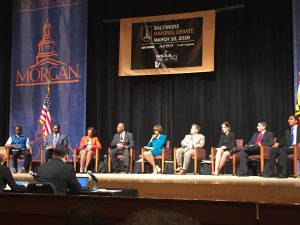With seven weeks before the polls open up to elect a new Baltimore City mayor, nine candidates took the stage at the Carl J. Murphy Fine Arts Center at Morgan State University to discuss issues of economic development, education, police policies and housing, Thursday night.
Compared to the eight other candidates on stage, though, one candidate’s been in the race just over 30 days and has less than 1 percent in the Baltimore mayoral poll, but he has a substantially higher number of followers on Twitter. Prominent activist DeRay McKesson was the first candidate to answer the question of why he should be the next mayor of Baltimore.
“I believe in the promise and possibility of this city. I grew up in this city, I love this city. It is my home and like you, I know that this city has challenges and the only way that we’re going to get through these challenges is when we choose new leadership,” McKesson said while sporting his signature blue vest, which he started wearing during protests and said makes him feel safe.

The candidates on stage included former mayor Sheila Dixon, State Sen. Catherine E. Pugh, City Councilman Nick J. Mosby, Elizabeth Embry, David Warnock, Patrick Gutierrez, and Calvin Young. After sorting through technical difficulties towards the beginning of the night, the candidates were asked a series of questions by four panelists: Marc Steiner of the Marc Steiner Show on WEAA, Karen Houppert, Editor of Baltimore City Paper, Sean Yoes for The Afro and host of The Sean Yoes Show on WEAA and Charles Ellison of The Ellison Report on WEAA 88.9 FM and The Root.
Early on in the debate, candidates were asked to stay in their seats and at times were yelling over one another as well as the moderator, Marsha Jews, of the WEAA show Keep It Moving w/ Marsha Jews. McKesson, however, maintained a relaxed composure and even appeared to be holding back a little when answering questions posed by panelists.
He explained this demeanor by saying that he doesn’t agree with the format of mayoral forums and with some improvements; they could run a lot smoother.
“I think about when I do house ‘meet-and-greets,’ and how that’s important to me,” McKesson said. “You are asking me real questions, and I’m on the hook; it’s just me. I can’t piggy-back off what someone else said, and there’s no interruptions. That’s how we should do this.”
Nonetheless, McKesson answered each question concisely and stayed on topic without interruption. He expressed his vision for attacking what he called “problems of scale” in Baltimore City.
“The plan I put forth is about having a strategy and attacking problems of scale. When we think about the issues that this city faces, these are scale issues. Forty percent of adults are illiterate, and 70,000 attics. I’m offering a plan that addresses these issues of scale.”
McKesson had a couple of supporters in the building with him, particularly Benjamin Jancewicz, a local designer and father of two children. Jancewicz said he endorses McKesson particularly because of his experience as a teacher and his stance on the city’s education system.
“I know DeRay’s background in education, and I know that his entire life revolved around education for a long period of time,” Jancewicz explained. “That’s one of the major issues I see in this city; it’s with education. I know that his ideas far outweigh most people on the stage and those not on the stage. Nobody has a more comprehensive education program than he has.”
McKesson’s low poll numbers aren’t an issue to him, and he says that he has some “non-traditional ways” to reach out to the people of the city. “I’m mindful that I’ve only been a candidate for 35 days,” he said. “The next 40 days, and the next seven weeks, are about getting in front of as many people as I can.”













